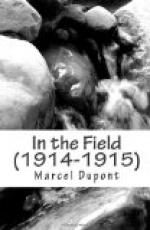I knew General T. well. He commanded a brigade in our garrison town of R. And a kindly chief he was, clear-minded, frank, and plain-spoken. I soon made up my mind to go to him and see what help I could get to enable me to rejoin my regiment. It would be a pleasure, too, to see him again.
I measured the distance with my eye—a kilometre, perhaps. There was no road, and to go across the fields would not be very easy, as there were walls and hedges round the meadows. I took the other way out of the village, and just as Wattrelot and I were leaving it we saw some wounded men arriving. They came slowly, helped along by their comrades, and there were such a number of them that they blocked the road. Those faces tied up with bandages clotted with perspiration, dust, and blood; those coats hanging open; those shirts torn, and showing lint and bandages reddened with blood; those poor bandaged feet that had to be kept off the ground—all this made a painful impression on me. No doubt this was because I was not accustomed to such sights, for others hardly took any notice of it.
“The ambulance! Where is the ambulance?” cried the men who were helping them along.
“At the station,” answered some soldiers, hardly looking round; “go straight on, and turn to the left when you get to the market-place.”
And the sad procession went its way. I jumped the ditch at the side of the road, and struck across the fields, spurring straight for General T. At that moment the rifle fire became more violent. Some forward movement was certainly beginning, for the infantry sections, that were lying in cover at the bottom of the valley, began to climb up the slope of the ridge on which I was galloping. Suddenly my horse swerved sharply. He had just almost trodden upon a body lying on the other side of the low wall of loose stones that I had just jumped. I drew rein. A sob burst from my lips. Oh! I did not expect to see that so suddenly. A score of corpses lay scattered on that sloping stubble-field. They were Zouaves. They seemed almost to have been placed there deliberately, for the bodies were lying at about an equal distance from one another. They must have fallen there the day before during an attack, and night had come before it had been possible to bury them. Their rifles were still by their side, with the bayonets fixed. The one nearest to us was lying with his face to the ground and was still grasping his weapon. He was a handsome fellow, thin and dark. No wound was visible, but his face was strikingly pale under the red chechia which had been pulled down over his ears.
I looked at Wattrelot. The good fellow’s eyes were filled with tears. “Come!” thought I, “we must not give way like this.”
“Wattrelot, my friend, we shall see plenty more. You know, they were brave fellows who have been killed doing their duty. We must not pity them....”
Wattrelot did not answer. I galloped off again towards the big rick by which stood General T.’s Staff. I had already forgotten what I had seen, and my attention was fixed upon that small group of men standing motionless near the top of the ridge. German shells kept bursting over them from time to time. We were now about 100 yards off, so I left Wattrelot and my spare horse hidden behind a shattered hovel and went alone towards the rick.




